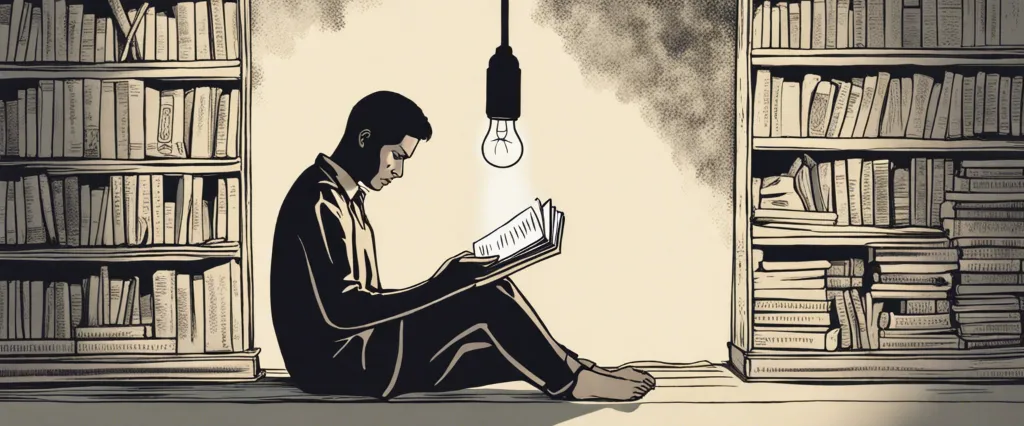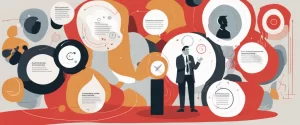
In the ever-evolving landscape of literature, there lies a myriad of voices offering their unique perspectives on topics that shape and influence our society. Amongst the literary realm, two thought-provoking books, “Inferior” by Angela Saini and “Excellent Sheep” by William Deresiewicz, emerge as prominent explorations of different dimensions of human existence. While both works delve deep into the intricacies of societal constructs and human experience, they do so from contrasting angles, offering readers distinct lenses through which to view the world.
Angela Saini’s “Inferior” challenges long-held beliefs regarding the superiority or inferiority of women in various areas of life. Through meticulous research and compelling arguments, Saini unveils a fascinating exploration of gender bias within the scientific and academic spheres. She dissects prevalent theories concerning differences between males and females in terms of intelligence, emotional capabilities, and strength, while debunking the fallacious assumptions that have perpetuated gender inequality. With her eloquent prose and eye-opening analyses, Saini invites readers to question and challenge societal norms, ultimately urging us to reconsider our perceptions of gender hierarchy.
Contrastingly, William Deresiewicz’s “Excellent Sheep” examines a different aspect of societal structures, focusing on the education system and its impact on young minds. Deresiewicz delves into the pressures imposed upon students by an increasingly competitive academic environment, addressing detrimental consequences such as loss of creativity, individuality, and a lack of intellectual curiosity. Drawing upon his own experiences as an educator, Deresiewicz offers a thought-provoking critique of a system that prioritizes grades and college admissions above personal growth and self-discovery. Through poignant anecdotes and compelling arguments, he challenges readers to rethink the purpose of education and question the long-term effects of a relentless pursuit of superficial achievements.
Although “Inferior” and “Excellent Sheep” address different subjects, they share a common goal – to challenge commonly-held beliefs and ignite discussions on topics that shape modern society. Saini’s exploration of gender bias and Deresiewicz’s analysis of the education system, although distinct in nature, shed light on the limitations and biases that pervade our understanding of ourselves and the world. As readers embark on this comparative study, they will be exposed to contrasting viewpoints that encourage them to critically evaluate established societal norms and reevaluate their own perceptions.
By examining the commonalities and divergences within these two enlightening works, we can gain a deeper understanding of the human experience and the vast array of influences and perspectives that shape it. Through an exploration of gender dynamics and educational systems, Saini and Deresiewicz’s books offer profound insights that challenge our preconceptions and compel us to reassess the way we view ourselves and our place in the world. Together, “Inferior” and “Excellent Sheep” provide readers with an opportunity to engage in a comparative journey that enriches our understanding of the underlying forces that shape society, sparking conversations that extend far beyond the pages of these thought-provoking tomes.
Brief Summary of Two Books
Inferior by Angela Saini
Inferior: How Science Got Women Wrong and the New Research That’s Rewriting the Story” by Angela Saini is a thought-provoking exploration of gender biases in science and society. The author delves into the long-standing assumption of female inferiority, examining its historical roots, the influential scientific studies that perpetuated this belief, and the consequences it has had on women’s lives.
Through extensive research and interviews with experts in various fields, Saini challenges the notion that women are innately less capable than men. She exposes flaws in certain studies that claimed to establish gender differences in intelligence, emotional capacity, and behavior, highlighting how these findings were often misinterpreted, misused, or based on faulty methodologies.
Saini also examines the cultural factors that have shaped these biases, such as the influence of patriarchal societies, traditional gender roles, and societal expectations. She discusses the ways in which these biases have not only hindered women’s advancement but have also reinforced harmful stereotypes and limited opportunities for both genders.
However, the book goes beyond critiquing the flawed science and provides a glimmer of hope. Saini shares groundbreaking research from different disciplines, including biology, neuroscience, and anthropology, that challenges the traditional narrative of female inferiority. This new research highlights the complexity of gender and reveals that many supposed gender differences are socially constructed rather than biologically determined.
Through “Inferior,” Angela Saini aims to debunk the myth of female inferiority by presenting compelling evidence and a fresh perspective on gender differences. The book encourages readers to question preconceived notions, challenge stereotypes, and advocate for a more equitable and inclusive society.
Excellent Sheep by William Deresiewicz
Excellent Sheep” by William Deresiewicz is a critique of the current educational system in America, particularly at elite universities. The author argues that despite the impressive credentials students possess, they lack critical thinking skills, creativity, and a sense of purpose. Deresiewicz challenges the idea of success as measured by prestigious careers and high salaries and questions the narrow definition of intelligence associated with standardized test scores. He highlights the pressure on students to conform and the emphasis on external achievement rather than personal growth. The book also explores the role of parents, schools, and society in perpetuating this system. Deresiewicz ultimately calls for a radical shift in educational priorities to foster intellectual curiosity, independent thinking, and the pursuit of a meaningful life.
Comparison between Two Books

Similarities in social change
Both “Inferior” by Angela Saini and “Excellent Sheep” by William Deresiewicz explore the concept of social change, though from different perspectives and topics.
1. Questioning Norms: Both books challenge conventional societal norms, urging readers to critically analyze existing structures and belief systems. “Inferior” questions the patriarchal narrative of women’s inferiority in science, while “Excellent Sheep” challenges the traditional definition of success in education.
2. Outdated Beliefs: Both books argue against outdated beliefs and stereotypes that hinder progress and social change. “Inferior” exposes and challenges the notion that women are biologically inferior to men in terms of their abilities and interests. Similarly, “Excellent Sheep” critiques the belief that a narrow focus on high achievement and elite education is the only path to success and fulfillment.
3. Advocacy for Change: Both authors advocate for change in their respective areas of focus. Saini calls for a more inclusive and equitable approach to scientific research, urging society to recognize and encourage the contributions of women. Deresiewicz advocates for a transformation of education, emphasizing the importance of intellectual and personal development over mere conformity and credentialism.
4. Exposing Systemic Issues: Both books shine a light on systemic issues that perpetuate inequality. “Inferior” highlights the gender biases and discrimination in scientific research and academia. Meanwhile, “Excellent Sheep” exposes the excessive pressure and narrow focus of the education system, which often leads to anxiety, conformity, and a lack of critical thinking skills.
5. Impact on Individuals and Society: Both books emphasize the broader implications of these issues on individuals and society. “Inferior” argues that recognizing and addressing gender biases in science can lead to more innovative and inclusive breakthroughs. “Excellent Sheep” suggests that transforming education can nurture independent thinkers and engaged citizens who contribute positively to society.
In summary, both “Inferior” and “Excellent Sheep” explore social change through their criticism of outdated beliefs, advocacy for change, exposure of systemic issues, and emphasis on the broader impact on individuals and society.
Divergences in social change
Inferior by Angela Saini and Excellent Sheep by William Deresiewicz both tackle important issues related to social change, but they approach them from different angles and present divergent viewpoints on these topics.
Firstly, Inferior by Angela Saini focuses on the topic of gender inequality and challenges the traditional beliefs about women’s inferiority in various fields. Saini provides a comprehensive overview of scientific studies that debunk the myths surrounding gender differences, particularly about intelligence and abilities. She argues that these misconceptions have been perpetuated by societal norms rather than by any inherent biological differences. By challenging these beliefs, Saini aims to contribute to the ongoing social change that seeks gender equality in all areas of life.
On the other hand, Excellent Sheep by William Deresiewicz delves into the pressures and challenges faced by students in elite educational institutions, such as Ivy League colleges. Deresiewicz argues that these institutions prioritize conformity, grades, and material success rather than nurturing individual passions and critical thinking skills. He believes that this approach stifles creativity and independent thought, hindering students from truly understanding themselves and their place in society. By highlighting the flaws in the educational system and encouraging students to pursue purpose and personal growth, Deresiewicz advocates for a change in the way we educate our future leaders.
While both books address social change, they diverge in their focus and target audience. Inferior primarily revolves around the issue of gender inequality and its impact on women, aiming to empower women by debunking the myths that have held them back for centuries. On the other hand, Excellent Sheep tackles the broader issue of educational systems and the impact they have on students, aiming to inspire a transformation in the way we educate and prepare individuals for their futures.
In terms of the approaches used, Inferior relies heavily on scientific evidence and research studies to challenge the prevailing beliefs about gender differences. Saini leverages empirical data to expose biases and societal misconceptions. Conversely, Excellent Sheep takes more of a philosophical and introspective approach, drawing on personal experiences and anecdotes to demonstrate the flaws in the education system and the need for change.
In summary, while both Inferior by Angela Saini and Excellent Sheep by William Deresiewicz address important social change issues, they diverge in their focus, target audience, and approaches. Inferior focuses on gender inequality, employing scientific evidence to counter prevailing beliefs, while Excellent Sheep sheds light on the flaws in the educational system, encouraging students to seek personal growth and meaning beyond societal expectations. Both books contribute to the larger conversation about social change, albeit from different perspectives.

Conclusion
The decision of which book is more worthy of reading ultimately depends on your personal interests, preferences, and what you hope to gain from reading. Here are some key points about each book:
1. “Inferior” by Angela Saini:
– Topic: This book explores the science behind gender inequalities and challenges the traditional claims of inherent cognitive and behavioral differences between men and women.
– Content: Saini extensively investigates various research studies and presents evidence that counters the prevailing stereotypes about women’s intellectual abilities.
– Impact: This book provides a compelling argument against gender biases and offers a fresh perspective on understanding the true nature of gender differences.
2. “Excellent Sheep” by William Deresiewicz:
– Topic: Deresiewicz delves into the culture of elite education, focusing on the pressures, expectations, and flaws of higher education institutions.
– Content: Through personal experiences and interviews, the author critiques the excessive focus on achievement and the lack of emphasis on personal growth, critical thinking, and creativity.
– Impact: This book offers insights into the drawbacks of the current higher education system and encourages readers to prioritize genuine learning, self-discovery, and pursuing meaningful passions.
Ultimately, if you are interested in understanding the science behind gender inequalities and challenging stereotypes, “Inferior” by Angela Saini may be more suitable for you. On the other hand, if you are intrigued by the flaws of elite education and want to explore the concept of true learning and personal growth, “Excellent Sheep” by William Deresiewicz might be the better choice.



